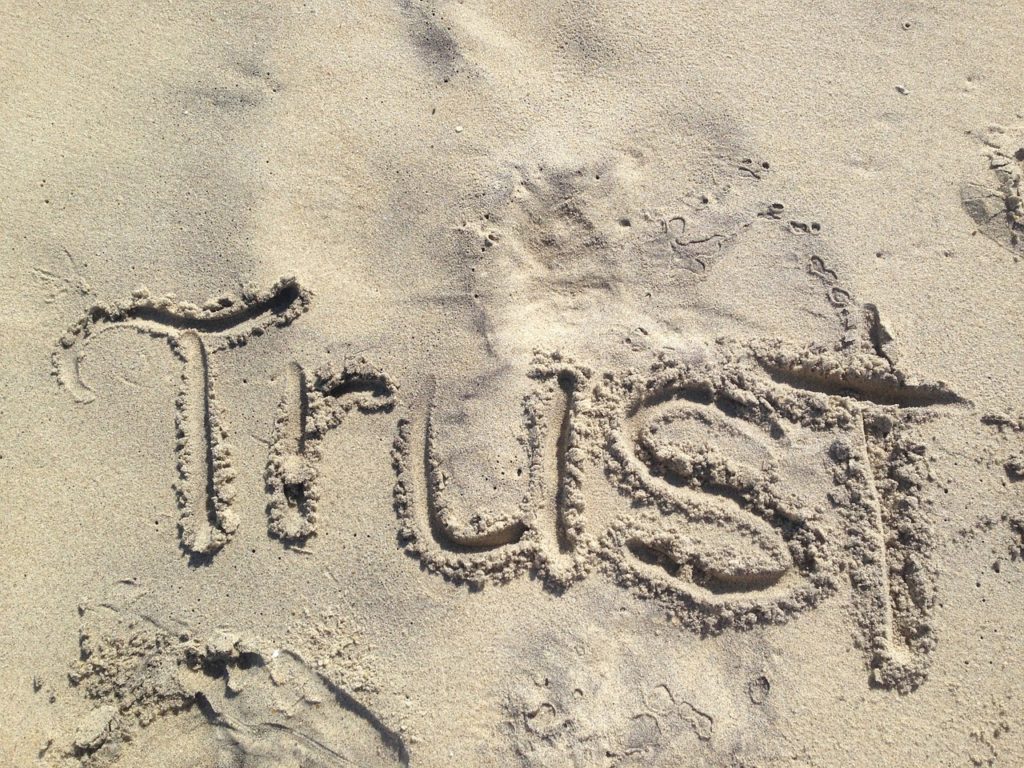
It’s hard to overestimate the importance of trust right now. When we are surrounded by uncertainty, when we witness daily the behaviour of charlatans and opportunists in public life, it takes a wrecking ball to our faith in honest and transparent dealings. And yet when it comes to donor relationships, honesty and transparency are the glue that will hold everything together. When donors are asked why they give, one of the most prevalent answers is simply this. Because they trust you. Lose that trust and you can guarantee that relations will cool and fingers will soon be hovering over the cancellation button.
A donor’s trust will operate on two levels – trust in the organisation and trust in you as a person. As a major donor fundraiser, your main priority is to build the relationship with the organisation and the cause. This is the lasting connection and the one that really counts. As a consultant this is doubly true for me, but for any major donor fundraiser, if you leave a role and the relationship goes with you, you haven’t done your job properly. (Be wary too of any organisation who wants you to bring donors over with you. Of course you can maintain these relationships, but poaching donors to the detriment of your former cause is unethical and not a good look).
I’ve met quite a few fundraisers in my field who vastly overestimate the importance and validity of ‘getting wealthy people to like them’. What you really need to be doing is getting them to trust you, and for this you need to leave your ego at the door and focus on what it is that they need.
It’s the small things
Nothing kills trust like flakiness. Building trust as you are getting to know your donor is nothing more complicated than being responsive and doing the things you’ve promised. That means emails and phone calls being returned the same day, information being sent out in the format you’ve agreed, thank you notes being sent promptly and thoughtful gestures being made that show you’re paying attention. Accumulatively these small things have a big impact and add up to someone who is a person of their word. When you first sit down at your desk in the morning, get into the habit of attending to your external donor emails first and – unless they’re urgent – leaving the staff memos until afterwards. Although it may not always feel this way, internal politics can wait but donors’ needs shouldn’t.
Don’t conceal problems from a major donor
Things don’t always go to plan. Sometimes we are culpable, but more often than not it is a collection of circumstances beyond our control – the appeal that got drowned out by a major catastrophe, a reputational issue with a high profile ambassador or a series of resignations in your team that have left you understaffed and struggling to deliver.
Your relationship with a major donor is a partnership and whilst it’s understandable you want to show them your best party face, this isn’t always realistic. If a project looks like it’s starting to hit the buffers, be transparent about the issues early on. Do it in an open-handed, non-dramatic way and bring them into the picture. They may even be able to help, but if you pretend all is well and they find out later when the situation may have escalated, they are less likely to trust you in the future. Ironically, your failure to confide in them will make them feel marginalised as if you don’t trust them! Very counterproductive.
Know where your red lines are
Sorry to use the dreaded phrase, but when it comes to due diligence it’s important to know where the boundaries lie both for your organisation and for you. Whilst as major donor fundraisers we need to be pragmatic and non-judgemental, if something comes up in prospect research that raises red flags, report it factually and unemotionally so a decision can be made by your Chief Executive as to whether this person is suitable for your pipeline. Never gloss over this responsibility and if something feels intrinsically wrong to you, raise it. You may not be listened to, but you will at least have covered yourself.
There’s a big difference between holding your nose because you find a donor unsavoury and disagree with their political views and taking meetings with someone who’s suspected of human rights abuses. (I say this from personal experience, having once refused point blank to meet with a very pushy prospect who I found out was on an Amnesty watch list). With information in the public domain so easily accessible, there’s little excuse for saying you hadn’t realised. Just as you need to be a person of your word, you also need to be seen to live your values and those of your organisation. Donors will be watching and whilst some will be more squeamish than others, they are entrusting you with their money and have every right to judge your associations.
The intense scrutiny that charities have been under in recent years shows no sign of letting up and transparency continues to be king. Gaining and keeping the trust of donors will be of a higher currency than ever before and whilst it takes time to build, it can be dismantled frighteningly quickly if you take your eye off the ball. From day one, with every transaction you make with your donor, make trust and openness your central focus so that even when things are at sea, they feel secure and on solid ground. They’re far more likely to stick around…..